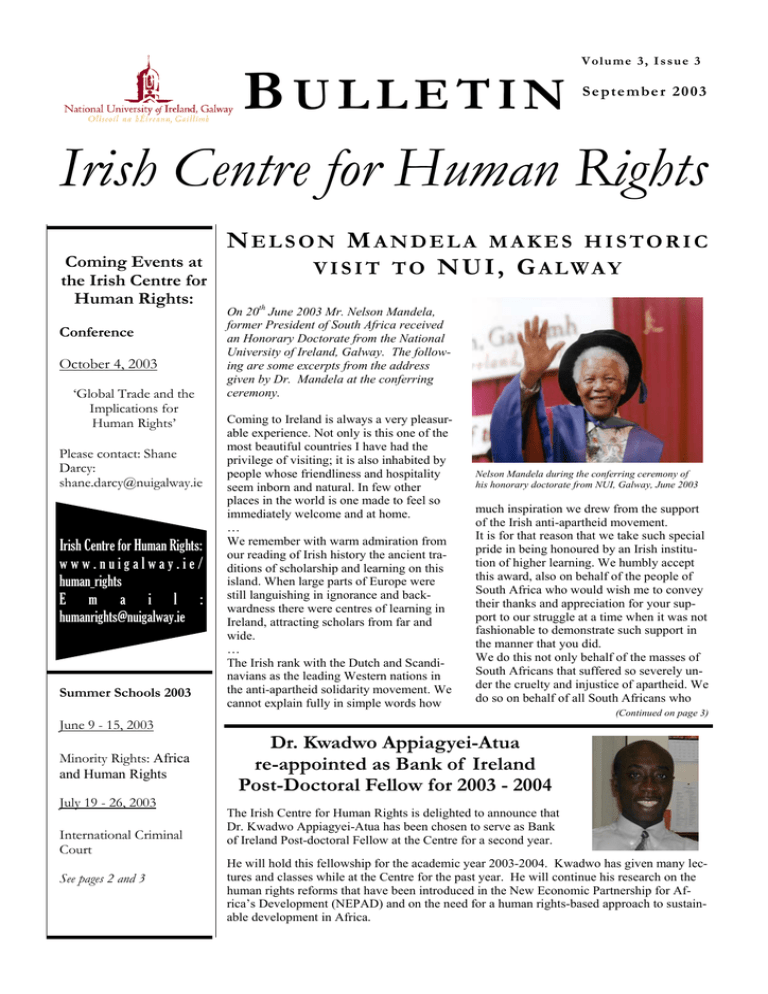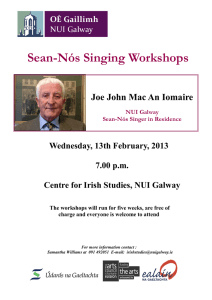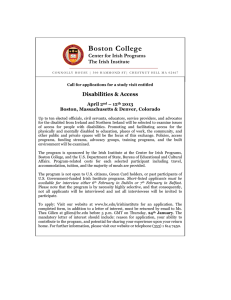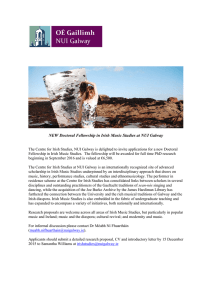B Irish Centre for Human Rights
advertisement

V o lu m e 3 , I s su e 3 BULLETIN Irish Centre for Human Rights S e pt e m be r 2 0 0 3 Coming Events at the Irish Centre for Human Rights: Conference October 4, 2003 ‘Global Trade and the Implications for Human Rights’ Please contact: Shane Darcy: shane.darcy@nuigalway.ie Irish Centre for Human Rights: www.nuigalway.ie/ human_rights E m a i l : humanrights@nuigalway.ie Summer Schools 2003 June 9 - 15, 2003 Minority Rights: Africa and Human Rights July 19 - 26, 2003 International Criminal Court See pages 2 and 3 NELSON MANDELA MAKES HISTORIC VISIT TO NUI, GALWAY On 20th June 2003 Mr. Nelson Mandela, former President of South Africa received an Honorary Doctorate from the National University of Ireland, Galway. The following are some excerpts from the address given by Dr. Mandela at the conferring ceremony. Coming to Ireland is always a very pleasurable experience. Not only is this one of the most beautiful countries I have had the privilege of visiting; it is also inhabited by people whose friendliness and hospitality seem inborn and natural. In few other places in the world is one made to feel so immediately welcome and at home. … We remember with warm admiration from our reading of Irish history the ancient traditions of scholarship and learning on this island. When large parts of Europe were still languishing in ignorance and backwardness there were centres of learning in Ireland, attracting scholars from far and wide. … The Irish rank with the Dutch and Scandinavians as the leading Western nations in the anti-apartheid solidarity movement. We cannot explain fully in simple words how Nelson Mandela during the conferring ceremony of his honorary doctorate from NUI, Galway, June 2003 much inspiration we drew from the support of the Irish anti-apartheid movement. It is for that reason that we take such special pride in being honoured by an Irish institution of higher learning. We humbly accept this award, also on behalf of the people of South Africa who would wish me to convey their thanks and appreciation for your support to our struggle at a time when it was not fashionable to demonstrate such support in the manner that you did. We do this not only behalf of the masses of South Africans that suffered so severely under the cruelty and injustice of apartheid. We do so on behalf of all South Africans who (Continued on page 3) Dr. Kwadwo Appiagyei-Atua re-appointed as Bank of Ireland Post-Doctoral Fellow for 2003 - 2004 The Irish Centre for Human Rights is delighted to announce that Dr. Kwadwo Appiagyei-Atua has been chosen to serve as Bank of Ireland Post-doctoral Fellow at the Centre for a second year. He will hold this fellowship for the academic year 2003-2004. Kwadwo has given many lectures and classes while at the Centre for the past year. He will continue his research on the human rights reforms that have been introduced in the New Economic Partnership for Africa’s Development (NEPAD) and on the need for a human rights-based approach to sustainable development in Africa. Page 2 V o l u m e 3 , I ss u e 3 Conference on Global Trade and the Implications for Human Rights, October 2003 “The various aspects of trade liberalisation and globalisation will be critically examined and discussed in the light of their implications for human rights” The Irish Centre for Human Rights will host a conference titled ‘Global Trade and the Implications for Human Rights’ on Saturday 4th October 2003. The conference is organised by Human Rights for Change, a group recently formed by a number of doctoral students from the Irish Centre for Human Rights. The one-day conference is an academic platform at which the various aspects of trade liberalisation and globalisation will be critically examined and discussed in the light of their implications for human rights. Confirmed speakers include Professor William Schabas, Director of the Irish Centre for Human Rights, Angela Hegarty, University of Ulster, Dr. Eleanor Doyle, University College Cork, Daniel Aguirre, Doctoral Fellow at the Irish Centre for Human Rights, Jim Loughran, Amnesty International and Dr. Su-ming Khoo, Department of Political Science, NUI, Galway. The conference is open to all and anyone interested in attending should contact: humanrightsforchange@yahoo.com President of the International Criminal Court addresses Irish Centre for Human Rights Summer Course Irish Centre for Human Rights: www.nuigalway.ie/ human_rights E m a i l : humanrights@nuigalway.ie ‘...an essential instrument that will be of immense use in the promotion of the rule of law and respect for human rights as societies emerge from conflict’ At this year’s third annual Summer Course on the International Criminal Court, the president of the recently created court, Mr. Phillipe Kirsch, delivered a lecture to the delegates on the history of the establishment of that body. Mr. Kirsch was elected as a judge in February 2003 and as president of the court in March. He spoke at length of the trials and tribulations of the negotiating process in Rome in 1998 which led to the eventual adoption of the Statute of the International Criminal Court. The Irish Centre for Human Rights was most pleased to welcome President Kirsch to Galway for his second visit to the Summer Course. Conference on Applicable Law c o nve ne s i n Ge n e va From 16-18 June, an international conference was convened in Geneva by the United States Institute of Peace, in partnership with the Office of the High Commissioner for Human Rights and the Irish Centre for Human Rights. The conference brought together ninety leading experts in the fields of peacekeeping and human rights, from 24 countries, to consult upon a series of model transitional codes for use in a post-conflict setting. The model codes were developed under the Applicable Law in Complex Peace- Other speakers at the week-long course included Ambassador David Scheffer, United States Ambassador to the United Nations for War Crimes, Professor William Schabas, Director of the Irish Centre for Human Rights and Daryl Mundis, Office of the Prosecutor at the International Criminal Tribunal for the Former Yugoslavia. keeping Situations project, undertaken by the Irish Centre for Human Rights in August 2000. Speaking at the opening of the conference, the Acting High Commissioner for Human Rights, Dr. Bertrand Ramcharan, stated the draft legislation ‘represents a point of departure and the creation of an essential instrument that will be of immense use in the promotion of the rule of law and respect for human rights as societies emerge from conflict’. Currently, the various recommendations put forward in Geneva are being integrated into the model codes and work on the project is expected to continue, under the coordination of the Irish Centre for Human Rights, until August 2004. Page 3 Vo l u m e 3 , I s s u e 3 Continued from Page 1 “The world is now in greater need than ever for men and women of peace to stand up and let their voices be heard and their commitment felt” Irish Centre for Human Rights: www.nuigalway.ie/ human_rights E m a i l : humanrights@nuigalway.ie now live in a non-racial and democratic South Africa. The defeat of apartheid and the transition to democracy could not have been achieved in the manner it occurred without the support of the international community. All South Africans today share in the fruits of your contribution and would thank you for helping to achieve a nationhood that is inclusive and provides a place for all its people. … The world is now in greater need than ever for men and women of peace to stand up and let their voices be heard and their commitment felt. One should not allow yourself to fall too easily into alarmist readings of any epoch or period; but there are worrying signs of increasing unilateralism on the part of some nations or groups of nations. We have not heard any reasonable voice in the world defending Saddam Hussein and his regime. The chorus of protest against the war in Iraq was directed towards the unilateral action taken and the disregard for the organs of multilateral governance, particularly the United Nations. Let us hope that as the League of Nations and the United Nations Organisation grew out of the urgent recognition for multilateralism after a period of destructive conflict, sanity will once more prevail in the wake of the war in Iraq. We cannot allow the world to again degenerate into a place where the will of the powerful dominates over all other considerations. That will surely prove to be a recipe for growing anarchy in world affairs. The war in Iraq has created a challenge to the United Nations to reassert its role and place in world governance. All men and women of peace, all leaders committed to the ideal of world peace, all governments who seek democracy within and amongst nations, should rededicate themselves to the strengthening, and if needs be restructuring, of our world body and other multilateral organs. We cherish our association with this nation and its people. The Republic of Ireland came out of great and often bloody struggle. It stands today as an example of a country that has built a better life for its people on the foundations of the peace and stability that developed within the republic. We thank you once more for the honour you have done us today. Let us together hope and work for a world in which there where will be peace and on the basis of that peace the building of a more prosperous life for all the people of the world. I thank you. Minority Rights Summer School Success “...Visiting speakers included Professor Gudmundur Alfredsson, Raoul Wallenberg Institute of Human Rights and Professor Patrick Thornberry, Keele University” The annual Summer School on Minority Rights organised by the Irish Centre for Human Rights attracted a record number of delegates this June. This year’s course had a particular focus on minority rights in Africa, as well as the issue of racial discrimination. Dr. Kwadwo Appiagei-Atua, Dr. Vinodh Jaichand and Professor William Schabas all spoke on the subject of minority rights in Africa. Visiting speakers included Professor Gudmundur Alfredsson of the Raoul Wallenberg Institute of Human Rights and Professor Patrick Thornberry of Keele University. Pictured at this year’s Summer School were (l-r) Jone Mugica Inciarte of the Human Rights Section of the European Commission, Antoine Martel, Summer School co-ordinator and LL.M candidate at the Irish Centre for Human Rights and Dr. Vinodh Jaichand of the Irish Centre for Human Rights. Centre’s Students to participate Specialisation Course in International Criminal Law, Siracusa, Italy Three doctoral students from the Irish Centre for Human Rights are to take part in a Specialisation Course in International Criminal Law being held in Siracusa this September. The course is being run by the International Institute of Higher Studies in Criminal Sciences under the guidance of its president, Professor M. Cherif Bassiouni. The participating students are Anthony Cullen, Vivienne O’Connor and Nicolaos Strapatsas. The Centre’s Director, Professor William Schabas will also deliver a number of lectures during the course. Page 4 V o l u m e 3 , I ss u e 3 Recent Visitors: Professor David Kretzmer, former member of the UN Human Rights Committee David Scheffer, former United States Ambassador for War Crimes to the United Nations VISITORS TO THE IRISH CENTRE FOR HUMAN RIGHTS EU-CHINA HUMAN RIGHTS NETWORK MEET IN GALWAY The Irish Centre for Human Rights is most pleased to welcome Professor Juan Manuel Portilla Gómez to the Centre for his sabbatical year. Professor Portilla comes from Mexico City and lectures in public international law and diplomatic law at the National University of Mexico. He intends to spend this year researching in the areas of international criminal and humanitarian law and in On 1st and 2nd September 2003 the EUChina Human Rights Network held a Network Seminar at the Irish Centre for Human Rights. The specific theme of this meeting was the issue of freedom of association in China. The various discussion panels were chaired by Professor William Schabas, Director, Irish Centre for Human Rights and Professor Liu Hainian, Director, Center for Human Rights Studies at the Chinese Academy of Social Sciences. Some of the topics discussed include the role and function of civil society, NGOs and trade unions and the protection afforded to political and religious organisations under international human rights law. particular on the legal implications of his native Mexico’s involvement in peacekeeping operations. Irish Centre for Human Rights hosts Genocide Conference Irish Centre for Human Rights: www.nuigalway.ie/ human_rights E m a i l : humanrights@nuigalway.ie The Irish Centre for Human Rights Bulletin is compiled and edited by Shane Darcy. In June of this year the Irish Centre for Human Rights hosted the Fifth Biennial Meeting of the International Association of Genocide Scholars. Over one hundred and sixty delegates from all over the world attended the conference. The keynote address at the conference, delivered by Mr. Gerald Gahima, the Attorney General of Rwanda, examined the issue of accountability in postgenocide Rwanda. There were over fortyfive different panel discussions during the four-day conference examining a vast range of themes centred on the main subject of genocide. Students from the Irish Centre for Human Rights coordinated a book exhibit which displayed over 100 recent titles relevant to genocide. Pictured at the Fifth Biennial Meeting of the International Association of Genocide Scholars hosted by the Irish Centre for Human Rights are (l-r) Gerald Gahima, Attorney General of Rwanda, Joyce Apsel, President of IAGS, and Professor William Schabas, Director of the Irish Centre for Human Rights. If you wish to sign up for any of the above activities or to receive information regarding the work the Centre carries out, please to not hesitate to contact us at: Irish Centre for Human Rights, NUI Galway, Ireland. Phone: +353-(0)91-750464, Fax: +353-(0)91-750575, Email: humanrights@nuigalway.ie Website: www.nuigalway.ie/human_rights






